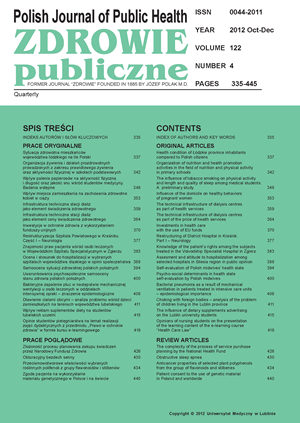Zgoda pacjenta na wykorzystanie materiału genetycznego w Polsce i na świecie
DOI:
https://doi.org/10.12923/j.0044-2011/122-4/a.20Słowa kluczowe:
oświadczenie woli, materiał genetyczny, zgoda pacjenta, polityka zdrowotnaAbstrakt
Obecnie wypracowane, opublikowane i stosowane modele świadomej zgody w przypadku wykorzystania, obróbki lub użycia materiału genetycznego wydają się niewystarczające i mogą prowadzić do nadinterpretacji lub złej interpretacji zasad formalnych użycia składowanego materiału genetycznego. W praktyce medycznej dąży się do uzyskiwania zgody pacjenta na wszelkie zabiegi, nie tylko terapeutyczne, lecz także na inne, np. mające charakter diagnostyczny. Zabiegi te, często pozbawione bezpośredniego celu leczniczego, łączą się nierzadko z dużym ryzykiem dla zdrowia pacjenta, który powinien o tym wiedzieć. Najczęściej stosowaną formą zgody jest tzw. zgoda świadoma, przy której kładzie się nacisk przede wszystkim na zrozumienie przez pacjenta tego co musi podpisać na określonym formularzu. Świadoma zgoda jest podstawowym elementem w kwestii subiektywnego zezwolenia na poddanie się jakiemukolwiek działaniu ingerującemu w sferę cielesno-psychiczną człowieka. Aktualnie obowiązujące przepisy zawarte w wielu niezsynchronizowanych ze sobą aktach prawnych w sposób wybiórczy traktują koncepcję świadomej zgody w przypadku pracy na materiale genetycznym (wykorzystanie, użycie, obróbka) i jego terminalnego (okresowego) wykorzystania. Kwestia biobankowania materiału genetycznego (zarówno na świecie jak i w Polsce) nie ma jeszcze jednego wiodącego i lansowanego rozwiązania, a występujące normy określające typ i rodzaj zgody są raczej częściami różnych aktów formalnych, niż jakimś jednym standaryzowanym modelem. Potrzebna jest nowa ujednolicona wykładnia prawa będącą podstawą dla pojęcia zgody jako oświadczenia woli w przypadku wykorzystania materiału genetycznego.
W pracy przedstawiono prawno-formalne ujęcie kwestii pojęcia i zakresu zgody, jako oświadczenia woli w przypadku wykorzystania materiału genetycznego. Dokonano analizy obecnie występujących w Polsce i na świecie rozwiązań prawnych ujęć kwestii pojęcia i zakresu zgody, jako oświadczenia woli w przypadku wykorzystania materiału genetycznego. Omówiono faktyczne i hipotetyczne kwestie sporne i interpretacyjne. Przedstawiono autorskie rozwiązanie uściślające kwestie świadomej zgody, które może być wykorzystane w praktyce.
Bibliografia
1. Convention for the protection of Human Rights and Dignity of the Human Being with regard to the Application of Biology and Medicine: Convention on Human Rights and Biomedicine. European Treaty Series (ETS) Nr 164. Oviedo. 4.IV.1997.
2. WMA Declaration of Madrid on Professional Autonomy and Self-Regulation. Adopted by the 39th World Medical Assembly Madrid, Spain. October 1987.
3. Art. 16 Ustawy z dnia 6 listopada 2008 r. O prawach pacjenta i Rzeczniku Praw Pacjenta. (Dz. U. z dnia 31 marca 2009 r. Nr. 52, poz. 417).
4. Ustawa z dnia 5 grudnia 1996 r. O zawodach lekarza i dentysty. (Dz. U. z 2005 r. Nr 226, poz. 1943).
5. Ustawa z dnia z dnia 30 sierpnia 1991 r. O zakładach opieki zdrowotnej. (Dz. U. 1991 nr 91, poz. 408).
6. Rozporządzenie Ministra Zdrowia z dnia 2 października 2006 r. w sprawie wymagań Dobrej Praktyki Klinicznej (Dz. U. Nr 194, poz. 1436).
7. Ustawa z dnia 23 kwietnia 1964 r. – Kodeks cywilny (Dz. U. z 1964 r. Nr 16, poz. 93).
8. Beauchamp TL, Childress JF. Principles of Biomedical Ethics. 4th ed. New York: Oxford University Press; 1994.
9. Wyrok SN z dnia 25 marca 1981 r. (11 CR 74/81).
10. Szczygieł G, Bagan-Kurluta K. Pricnciple of respecting medical confidentionality and protection of interests of third parties in association with threat to their health and life AIDS/HIV. Law and Medicine. 2004;3:16-6.
11. Nestorowicz M. Medical law. Torun: TNOIK; 2005.
12. Atras A, Patryn R, Marczewski K. Problems related with obtaining informed consent in opinions of students of the Medical University. Pielęgniarstwo XXI. 2006;1:11-25.
13. Niemczyk S, Łazarska A. Material and legal elements of declaration of patient consent from the legal and medical aspects. Law and Medicine. 2005;5:19-48.
14. Etchells E, Gilbert BA. Bioethics for clinicians: 1. Consent. Canadian Med Assoc J. 1996;155:1083-16.
15. Ahronhein JC, Moreno J. Ethics in clinical practice. Boston: Brown and Co; 1994.
16. Annas GJ. A national bill of patients’ rights. New Engl J Med. 1998;338(10):695-9.
17. Pawlikowski J, Sak J, Marczewski K. Biobank research and ethics: the problem of informed consent in biobanks. Arch Med Sci. 2011;7(5): 896-901.


